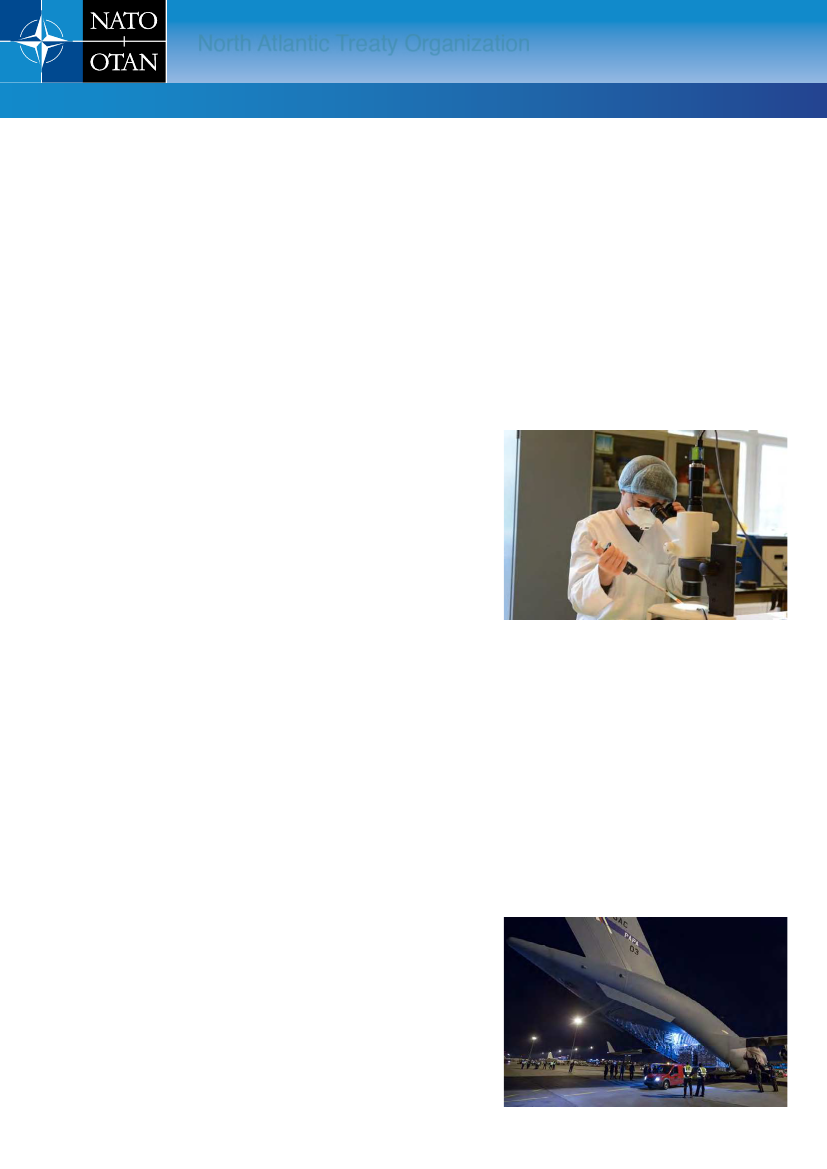
North Atlantic Treaty Organization
www.nato.int/factsheets
Factsheet
May 2020
NATO’s Response to the COVID-19 Pandemic
The COVID-19 pandemic is an unprecedented challenge. NATO Allies stand in solidarity in response to the pandemic. “NATO and
Allied military personnel have been key in supporting civilian efforts – setting up field hospitals, providing military airlift, sharing
medical expertise, and helping to develop innovative responses,” NATO Secretary General Jens Stoltenberg said about the Alliance’s
role in the relief effort.
While we continue to take all the necessary measures to protect our armed forces, NATO’s operational readiness remains undiminished.
Our forces remain vigilant and prepared to respond to any threat. During the COVID-19 pandemic, NATO continues to deliver
credible and effective deterrence and defence.
Preparing for the future of COVID-19
NATO Foreign and Defense Ministers recognised the need to do even more to
prepare for a resurgence of the disease at their meetings in April 2020. Defence
Ministers will continue to assess NATO’s response when they meet again in
June. NATO’s Supreme Allied Commander Europe (SACEUR) is developing
a plan for how we can further speed up the way we provide support, to prepare
for the future of the virus.
NATO is supporting innovation through research and scientific collaboration
on COVID-19. For example, NATO has tapped into its pool of 6,000 defence
scientists, calling for ideas to improve virus detection and decontamination.
Through the
NATO Science for Peace and Security Programme,
Italian and
Swiss scientists are collaborating on a NATO-supported project to develop
rapid COVID-19 diagnostics.
As part of a coordinated approach, NATO is working closely with other
international organisations, including the European Union. Allied Defence
Ministers discussed together with the EU preparations for the long-term effects
of COVID-19.
NATO launched a Science for Peace and Security Programme project
on 5 May 2020 with Italy’s Istituto Superiore di Sanità (National
Health Institute) and Tor Vergata University Hospital together with
the University Hospital of Basel University in Switzerland to develop
new tools for a rapid and accurate diagnosis of infection.
How NATO is helping to curb the pandemic
Hundreds of thousands of troops have been supporting civilian efforts across the Alliance. SACEUR is coordinating current military
support and a plan to make even more capabilities available. Military forces from across the Alliance have:
• flown more than 350 flights to transport medical personnel and more than 1,000 tonnes of equipment,
• helped build almost 100 field hospitals and over 25,000 treatment beds, and
• deployed thousands of medical personnel in support of civilian efforts.
NATO’s
Euro-Atlantic Disaster Response Coordination Centre
(EADRCC)
is helping to coordinate assistance, including medical and financial support.
The EADRCC is NATO’s main civil emergency response mechanism. The
Centre operates on a 24/7 basis, coordinating requests and offers of assistance.
Since the start of the crisis, the EADRCC has coordinated requests from UN
OCHA and 15 NATO and partner countries, garnering dozens of responses
in return.
The
Strategic Airlift Capability
(SAC) and the
Strategic Airlift International
Solution
(SALIS) programmes, managed by the
NATO Support and
Procurement Agency
(NSPA), have delivered over 1,000 tonnes of medical
supplies to Allies including Bulgaria, the Czech Republic, Germany, Hungary,
Poland, Romania and Slovakia.
A C-17 military plane, part of the Strategic Airlift Capability,
delivered medical supplies to Bulgaria on 17 April 2020.